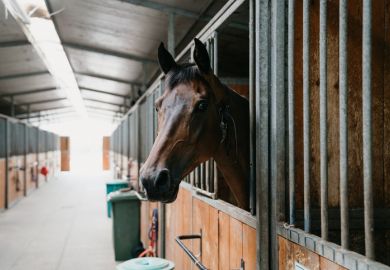Robinson Crusoe is a fantasy that starkly reminds us that the normal state of a human is to be among others of its kind. In Friday's Footprint, Leslie Brothers charges neuroscience with entertaining exactly that fantasy: treating the brain as though it were in isolation from others of its kind. What is her alternative?
The author is firstly a clinician and so privy to the strange world of minds gone wrong. Autism is the most notorious failure of social understanding. But consider Capgras syndrome in which sufferers unshakeably believe that a close friend or relation has been replaced by a double (as in Invasion of the Body Snatchers) who looks identical but is most definitely not that person; or its reverse, Fregoli syndrome, in which the afflicted meets the same person in a host of other people's bodies.
A stroll through this gallery of terrifying conditions shows us how easily the perception of other people and the social experience it normally provokes can be severed by minor neurological aberrations.
Brothers' next stop is the brain, a hothouse of high-level social processing. Listening in on single cells in the brain reveals that they respond to particular social acts such as "approaching" independently of variations in the composite behavioural elements. Alternatively you can stimulate cells yourself and see what the subject feels, a minor diversion that patients undergoing brain surgery indulge neuroscientists in. Very specific experiences result: a prod here and you are suddenly back in the playground with the school bully sitting on your chest; up a little and to the left and Beethoven's 5th comes crashing through the operating theatre. This is the ultimate in virtual reality.
Upon this groundwork, the author builds her vision of the link between brain and society. She hypothesises that a particular neural structure, the amygdala, is a "social editor" that biases us to attend to certain socially rich stimuli. For example, newborns selectively attend to their mothers faces and eyes and so discover the social information continuously provided there. Autists do not. Brothers wonders whether all of an autists deficits stem from this simple mischance - that they were never shown how to crack the social code.
The social editor helps hold society together since it ensures that normal humans attend to the same things and learn the rules of social interaction appropriate to their culture.
At this point, and in search of the means to explain how we come to perceive our selfhood and others' personhood, Brothers moves into areas more commonly associated with the social sciences, largely abandoning neurones in favour of narratives.
Her plea is that nothing else will serve: it is a group's narratives that organise the thought of its members, specifying the categories of their social experience. Conscious of the dangers in this necessary move "from the orderly garden of positivism to the wilderness of social constructionism", the author maintains a tight grip on her own narrative, avoiding a disastrous step into the realm of metaphor.
For biological psychologists, this is a sweetener for an otherwise bitter pill: the unpalatable prospect that social processes that cannot be seen or measured are yet instantiated in the brain.
This is an excellent book, treading the interesting, difficult and probably most fruitful ground between brain science and social science. Brothers never even mentions reductionism and books like this make us wonder why the labels of this well-worn debate produce so much antagonism in the human sciences.
The author herself moves effortlessly up and down levels of explanation and I hope the versatility of this slim volume will direct and assimilate research for many years to come.
Thomas Sambrook is honorary research fellow, dept of anthropology, Durham University.
Friday's Footprint: How Society Shapes the Human Mind
Author - Leslie Brothers
ISBN - 0 19 510103 0
Publisher - Oxford University Press
Price - £18.99
Pages - 187
Register to continue
Why register?
- Registration is free and only takes a moment
- Once registered, you can read 3 articles a month
- Sign up for our newsletter
Subscribe
Or subscribe for unlimited access to:
- Unlimited access to news, views, insights & reviews
- Digital editions
- Digital access to THE’s university and college rankings analysis
Already registered or a current subscriber?



